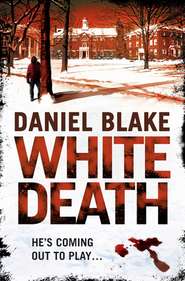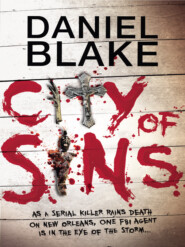По всем вопросам обращайтесь на: info@litportal.ru
(©) 2003-2024.
✖
Soul Murder
Автор
Год написания книги
2018
Настройки чтения
Размер шрифта
Высота строк
Поля
About the Publisher (#litres_trial_promo)
Friday, October 1st. 12:15 p.m. (#ulink_10dba0ba-9d45-594d-bb20-0bdabca7f8b6)
Franco Patrese hadn’t been inside a church for ten years.
Ironic, then, that his first time back was straight into the mothership itself; Saint Paul Cathedral, center of spiritual life for close on a million Pittsburgh Catholics.
The bishop himself had insisted. Gregory Kohler had first gotten to know Franco’s parents when he, as a young priest, had helped officiate at their wedding. He’d taught Franco and his sisters in the days when priests and nuns could still be found inside the classroom, and over the years had become family friend as well as pastor.
Now he’d offered Franco and his sisters the cathedral. You didn’t turn the bishop down, not if you were a good Catholic; and Bianca and Valentina had certainly kept the faith, even if Franco hadn’t. Besides, they needed all the seats they could get. Half of Bloomfield – an area of the city so Italian that the parking meters are painted red, green and white – had come to pay their respects to Franco’s parents.
Alberto and Ilaria Patrese had been killed five days before. Alberto had gone to pass a truck on the freeway at exactly the moment the truck driver had himself pulled out to overtake an eighteen-wheeler. The collision had flipped the Patreses’ car across the central reservation and into the path of three lanes of traffic coming the other way.
They hadn’t had a prayer.
The police had come to Franco first, as he was one of them: a homicide detective, working out of the department’s North Shore headquarters. When two uniformed officers had approached Franco’s desk, he’d known instantly that someone in his family was dead. He recognized the expression on those officers’ faces as clearly as if he’d looked in a mirror. He’d had to break similar news many times. It was the worst part of the job, and by some distance. Nothing rips at people’s lives like the death of a loved one.
Franco had found the immediate aftermath unexpectedly bittersweet. There’d been tears, of course, and shock giving way to spikes of anger and confusion; but there’d also been rolling gales of laughter at the hundreds of family stories polished and embellished down the years. He’d kept himself occupied with death’s legion of petty bureaucracies: police reports, autopsies, certificates, funeral arrangements, contacting relatives long-lost and far-flung. Busy meant less time to think, and less time to think meant more time to be strong, to make sure everyone else was bearing up all right, to deflect even the slightest gaze away from himself.
He was doing it even now, during the funeral service, sat in the front pew with his sisters either side of him and his nephews and niece tucked solemnly between the adults. Determined to be the rock on which the waves of grief could crash themselves out, Franco pulled Valentina close, ruffled the children’s hair, and squeezed Bianca’s hand when her jaw juddered and bounced against the tears.
The last notes of ‘Amazing Grace’ faded, and the congregation sat as Kohler climbed the steps to the pulpit. He was in his sixties, with a mane of hair that would have been the envy of a man half his age. The hands he raised as though in benediction of his flock were large and strong, and they did not shake.
Franco tuned out. He heard the grateful laughter when the bishop said something dry and affectionate, but he was miles away, thinking about the things he wished he’d told his parents while he’d still had the chance, and about the things he was glad he hadn’t told them. They hadn’t known everything about his life, and he had no illusions that they should have done so. He knew they’d loved him, and nothing was more important. But he knew too that loving people meant protecting them.
Somewhere in the distance, Kohler was talking about God, though it was not a God Franco believed in any more. As far as he was concerned, his parents’ death had been blind chance, nothing more. Wrong place, wrong time. Why them? Turn it round: why not them? You were born, you lived, you died. Mercy and justice and compassion weren’t divine traits; they were human ones, and by no means universal. If you didn’t believe that, Franco thought, working homicide would soon change your mind. Religion was just a polite word for superstition, and superstition was just a polite word for fear.
Franco hooked a finger inside his collar and pulled at it. He felt suddenly short of breath, and his skin was clammy.
When Bianca looked at him, her face seemed to swim slightly in his vision before settling. Her eyebrows made a Chinese hat of concern and query.
‘Is it hot in here?’ he whispered.
She shook her head. ‘Not for me.’
Franco’s ribs quivered with the thumping of his heart. He stood on unsteady legs, stepped over Bianca’s feet and walked quickly down the aisle, looking neither left nor right till he was out the huge main door and into the shouty, safe bustle of students from the nearby university ragging each other and putting the world to rights.
Monday, October 4th. 8:12 a.m. (#ulink_3e6f3d30-f4b7-5260-82fa-793a7ddeb139)
The police department offered Patrese two weeks’ compassionate leave.
He took two days, and even those didn’t really count, given that they were both at the weekend. So he was back at his desk first thing Monday morning, to the unsurprised but good-natured exasperation of his homicide partner, Mark Beradino.
‘Sheesh, Franco. You don’t want your fortnight, I’ll take it.’
Patrese laughed, thankful that Beradino knew better than to kill him with kindness.
Physically, Beradino was pretty nondescript. Five ten, 180 pounds, hair graying but still pretty much all there, and features which were bang-on regular. He was no Brad Pitt, but nor was he a Michael Moore. You could walk past him in the street without noticing; even if you did notice, you’d have forgotten him five steps later. He’d have made a great spy.
But he was a detective; a hell of a detective, in fact.
As far as Pittsburgh Homicide was concerned, he was practic ally an institution.
He’d been there since the early eighties – most of his clothes looked as though he’d bought them around that time – and he was known on both sides of the law as a good cop. A tough one, sure, one who thought cops should be cops rather than politicians or social workers, but an honest one too. He’d never taken a bribe, never faked evidence, never beaten a suspect up.
Not many cops could say the same.
He and Patrese had been partners for three years – itself a vote of confidence in Patrese’s ability – and in that time they’d become friends. Patrese was a regular guest at the condo in Punxsutawney which Beradino shared with his partner Jesslyn Gedge, a warder at the State Correctional Institute in Muncy. Both Beradino and Jesslyn had been among the mourners in Saint Paul’s.
‘But since you’re here,’ Beradino continued, ‘make yourself useful. We just got a case. Domestic dispute, shots fired, man dead. Zone Five.’
There are six police districts in Pittsburgh, numbered with the complete absence of discernible logic that’s the hallmark of the true bureaucrat. Zone Five covered the north-eastern corner of the city; East Liberty, East End and Homewood.
Nine times out of ten, an incident in Zone Five meant an incident in Homewood.
Homewood was Pittsburgh’s pits, no question. Homicides, aggravated assaults, weapons and narcotics offenses, prostitution arrests; you name it, there were twice as many in Homewood as in any other neighborhood. It was one of the most dangerous places to live in all of Pennsylvania, and that was saying something.
It was half an hour from police headquarters on the North Shore to Homewood. Patrese and Beradino drove there in an unmarked car; no need for lights or sirens, not when the victim was dead and the uniforms had the scene secured.
You could always tell when you were getting close. First came one splash of gang graffiti, then another, and within a couple of blocks these bright squiggles were everywhere: walls, houses, sidewalks, stop signs.
Our turf. Back off.
Then the pockets of young men on street corners, watching sullenly as the cop cruisers came past; then the rows of abandoned buildings, swallowing and regurgitating an endless stream of vagrants, junkies and whores; then the handful of businesses brave or desperate enough to stay: bars, barber shops, convenience stores, fast-food joints.
Wags from out of town liked to call Patrese’s city ‘Shitsburgh’. He usually jumped down their throat when they did – he loved this city – but when it came to Homewood, even Patrese was forced to admit that they had a point.
Tragedy was, it hadn’t always been like this.
A century and a half ago, Homewood had been the place to live. Tycoons like Westinghouse and Frick had kept estates here. Businesses boomed, a trolley system was built, and people couldn’t move in fast enough.
And so it stayed till after the Second World War, when the city planners decided to build the Civic Arena downtown. In doing so they had to displace thousands of people, mainly poor black families, who’d been living in the Lower Hill District nearby. Most of them moved to Homewood; and, sure as sunrise, most of Homewood’s whites upped sticks and left, fleeing to suburbs further out. The few middle-class blacks who could afford to follow them did.
Then came the riots, here as everywhere else during the civil rights era. With the riots came drugs and gangs with names that sounded almost comic: Tre-8s-Perry and Charles, Sugar Top Mob, Down Low Goonies, Reed Rude Boyz, Climax Street.
Nothing comic about what they did, though. Not then, not now. Drugs and guns, guns and drugs. It was a rare gangbanger who died of old age.
Up ahead, Patrese saw a crowd of people spilling from the sidewalk on to the street. A handful of cops held them back. Across the way, two more police cruisers were pulling up. The officers held themselves tense and watchful, as well they might. Cops here were the enemy, seen as agents of an alien and oppressive ruling class rather than impartial upholders of law and order.
Patrese and Beradino got out of the car. A few feet away, a young man in a bandana and baggy pants was talking urgently into his cell.
‘Yo, tell cuz it’s scorchin’ out here today. And this heat ain’t from the sun, you know wha’ I’m sayin’?’
He stared at Patrese as he ended the call, daring Patrese to challenge him. The police call it eye fucking, when an officer and a criminal stare each other down. As a cop, you can’t afford to back away first. You own the streets, not them.
Patrese and Beradino pushed their way through the crowd, flashed their badges at one of the uniforms, and ducked beneath the yellow-and-black stretched taut between two lampposts.
It was a three-story rowhouse, the kind you see all over Homewood, set slightly up from road level with a veranda out front. Every homicide cop with more than a few months’ experience had been inside enough of them to know the layout: kitchen and living room on the ground floor, couple of bedrooms and a bathroom on the floor above, and an attic room with dormer windows under the eaves.







